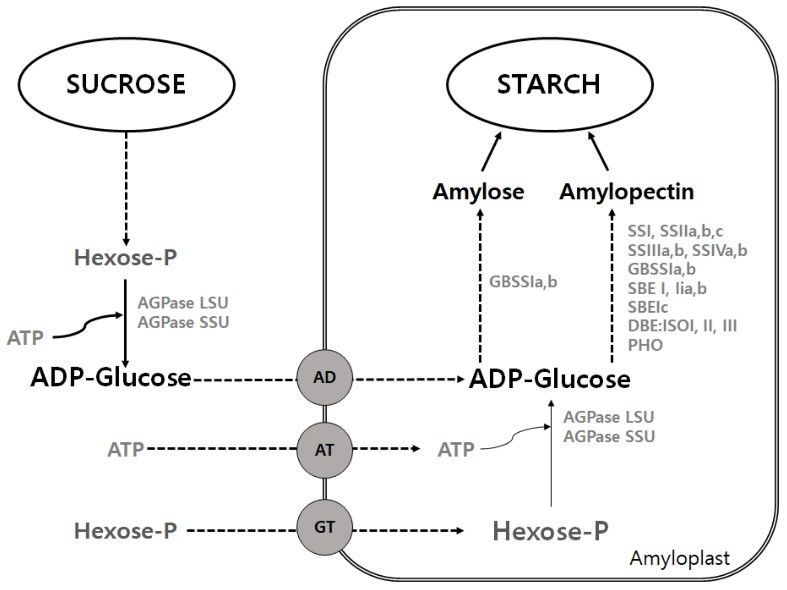ADP-Glucose Pyrophosphorylase (AGPase) Modification
Inquiry
The Importance of AGPase
AGPase is an enzyme in the synthesis of starch in plants and glycogen in bacteria. It catalyzes and converts glucose-1-phosphate to ADP-glucose. This reaction provides the glucose-activated donor required for starch synthesis. AGPase consists of two pairs of subunits of regulatory size. It is a heterotetramer. As the rate-limiting enzyme, its activity can affect starch synthesis in plants. Its activity is regulated by gene expression and two mutational regulators.
 Fig.1 Starch biosynthesis pathway. (Kim & Kim., 2021)
Fig.1 Starch biosynthesis pathway. (Kim & Kim., 2021)
Starch modification is required to obtain starch with a higher content as well as good properties. As the first rate-limiting enzyme, it has been widely studied as a means to regulate starch synthesis. Currently, starch synthesis can be regulated by altering the AGPase expression level, the activity of the enzyme, etc.
Services
CD BioGlyco has extensive experience in AGPase gene modification. We modify the structure, content, etc., of starch by adding modifying regulators or by regulating the AGPase expression level. We will complete all or some of these experiments from vector construction to plant and animal experiments.
- Gene editing service
We influence the process of starch synthesis by up-regulating or inhibiting the expression of AGPase, which ultimately affects the content and structure of starch, etc. We provide a complete set of gene modification services or any of the experiments, such as synthesizing vectors. Firstly, we construct AGPase overexpression or RNAi vectors and obtain transgenic plants through Agrobacterium-mediated transformation. Then identify the transgenic lines through β-glucuronidase (GUS) staining and polymerase chain reaction (PCR). After that, we will test the content and physicochemical properties of starch, and so on of the transgenic lines after a period of cultivation. We also check the expression level of AGPase in each part as well as the activity of the enzyme AGPase.
- Alteration regulation service
We introduce theAGPase gene, which is more active but not sensitive to alteration regulation, into the plant for expression. After cultivating it for a period of time, we examine the expression level of the AGPase gene, the enzyme activity of AGPase under the action of the alteration regulator, and the change in starch content.
 Fig.2 The general process of genetic modification. (CD BioGlyco)
Fig.2 The general process of genetic modification. (CD BioGlyco)
Applications
- Regulation of AGPase expression can be used to increase starch content in food crops and to obtain plants with high starch content.
- Gene editing of AGPase has helped researchers explore their functions in plants and breeding options.
- Genetic modification of AGPase can regulate plant growth, increase the resistance of transgenic plants to the environment, and improve photosynthesis and source-sink relationships.
Advantages
- We design primers with good specificity. The PCR primers ensure optimized amplification efficiency.
- Compared with traditional gene targeting methods, our optimized gene editing technology greatly shortens the cycle of R&D. At the same time, the technology is highly efficient and ensures that projects are completed on time.
- Precise editing of the genome can be performed, including high-efficiency knockout, up-regulation, and knock-down. We will also perform multi-step validation to ensure reliable results.
CD BioGlyco provides highly efficient solutions with reliable and accurate results according to customers' requirements. In addition to modifying starch by regulating the AGPase expression or allosteric regulation, we also provide genetic gene modification of Starch Synthase, Starch-Branching Enzyme, Debranching Enzyme, and their enzyme activity. If you need this type of service, please feel free to contact us.
References
- Sakulsingharoja, C.; et al. Engineering starch biosynthesis for increasing rice seed weight: the role of the cytoplasmic ADP-glucose pyrophosphorylase. Plant Science. 2004, 6(167): 1323-1333.
- Kim, K.H.; Kim, J.Y. Understanding wheat starch metabolism in properties, environmental stress condition, and molecular approaches for value-added utilization. Plants. 2021, 10(11): 2282.
For research use only. Not
intended for any clinical use.
Quick Links
Related Services


 Fig.1 Starch biosynthesis pathway. (Kim & Kim., 2021)
Fig.1 Starch biosynthesis pathway. (Kim & Kim., 2021)  Fig.2 The general process of genetic modification. (CD BioGlyco)
Fig.2 The general process of genetic modification. (CD BioGlyco) 


